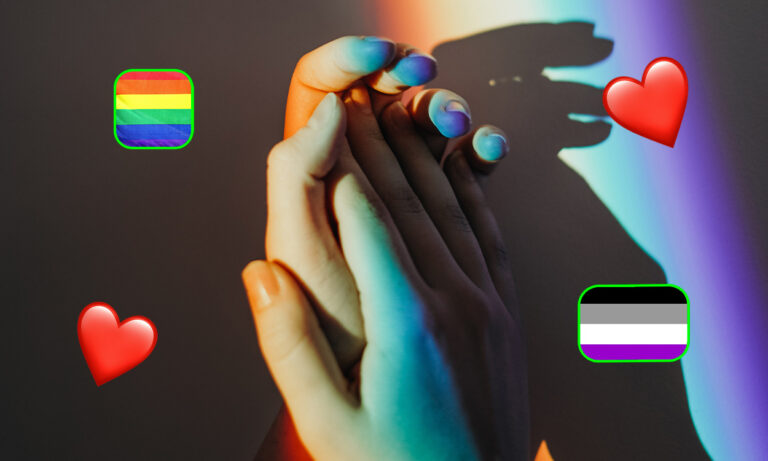Understanding the asexual community: Dating isn’t just for the cishets of the world
Time and time again, we’re told that sexuality is a spectrum. So, why is it that in both the media and in society this supposedly vast spectrum is regularly diminished and generalised into a narrow binary? When LGBTQIA+ representation occurs, it’s often translated in ways considered palatable to the heterosexual majority. And those identities that don’t conform to what’s now considered socially acceptable are often downplayed, misconstrued or erased altogether.
According to recent Census data, there are currently 28,000 people in England and Wales who identify as asexual. Moreover, gen Zers are by far the most sexually insightful and diverse generation yet, with many of them embracing this sexuality.
So, why is it we still know so little about asexuality? And how do we effectively educate society about the misconceptions and misunderstandings surrounding asexuality? SCREENSHOT teamed up with dating app Pure to gain a greater perspective from the source itself: those who identify as asexual.
What is asexuality?
If you were to look for a definition of asexuality online, you’d most likely find the words: “the quality or characteristic of experiencing no sexual feelings or desires.” Now, this is an incredibly narrow interpretation of what asexuality is, and it leaves a real void. So, it was important to conduct our own research.
Firstly, we asked Pure users: “How would you describe being asexual to someone who’s never heard of it?” Here’s how they responded:
One person described it as simply “not enjoying sex” while another offered the metaphor of “not being hungry.” In a similar vein, one individual described it as “being able to appreciate what’s on the menu, but not being hungry enough to order.”
Of course, it should be noted that a number of people who identify as asexual may be averse to sexual contact, but that doesn’t mean they’re completely anti-affection. One respondent aptly put “sexual intimacy isn’t my cup of tea, but other intimacy is lovely.” A separate interviewee put it simply: “the sexual attraction level you have for your parents which is zero, is how I feel about everyone.”
What is a common misconception about being asexual?
Due to the fact that the general population knows so little about asexuality, it’s important we strike out some harmful stereotypes and or preconceived notions about what it means to identify this way.
One of the overarching themes that cropped up from the survey was the idea that asexual people are completely disinterested in relationships. A number of the Pure users emphasised in their responses that they found it frustrating when people assumed that they didn’t want to fall in love or experience romance, or indeed that they were simply “prudes” because they were opposed to sex.
In fact, most asexuals are actively interested in finding love. They just have a slightly different criteria when it comes to choosing a potential partner. For example, “respecting boundaries” is a massive priority, quickly followed by zero pressure for sexual intercourse.
Asexuality does diverge from what society has previously considered ‘atypical’ in a romantic relationship so it’s crucial anyone entering into a partnership with someone asexual fully understands their boundaries and makes sure to respect them—regardless of whether or not it’s something they’ve previously encountered.
Moreover, 90 per cent of the survey respondents stated that they do not celebrate Valentine’s Day—reaffirming that, while asexuality does not translate to zero romance, it does usually infer that asexual couples may choose to show love and companionship in less traditional settings, potentially favouring alternative celebrations over those historically moulded by heterosexual pairs.
Due to a lack of representation in society, what made you realise that you might be asexual?
Don’t get me wrong, LGBTQIA+ representation in mainstream media is still incredibly sparse and often rather lacklustre. However, there is definitely greater onus put on depicting gay, lesbian, and trans stories, then say characters who identify as pansexual or asexual.
Because of this, a number of young people may struggle with understanding their own sexuality, or may think that there’s something wrong with them because they’re not following the same paths as their friends. For example, one of the answers we received read: “Everyone started dating in their early teens and I just couldn’t understand why.”
It’s important to highlight how some asexual individuals first discovered their own identities—particularly if it could help reassure others who might be questioning themselves.
Some of the responses we gathered included sentiments such as simply always knowing that they weren’t interested in sex. They found the idea of intercourse overwhelmingly complicated and repeatedly clarified with potential partners that they were solely looking for “platonic connections” rather than anything overtly intimate.
How can dating apps become more inclusive?
Finally, we wanted to ask asexual individuals more about their thoughts on dating apps, why they’ve previously been so exclusive or the LGBTQIA+ spectrum, and what actions can be taken to ensure everyone now feels welcome to participate.
One of the major points a majority of the answers hinged upon was the fact that cishet (cisgender, heterosexual) relationships, and the ways in which they connect, have always dominated the space. Some asexual individuals stressed the fact that historically, dating apps have taken the easy route when it comes to creating parameters to cater to different subcategories of sexual identity such as pansexual and demisexual.
It’s also true that ‘sex sells’ and so people who are averse to sex end up being completely erased and ignored from the dating space.
According to the community, in order to move forward and make dating apps more accepting and accessible for asexual individuals, they need to “promote different types of connection,” “create more safe options for asexual people,” and become “more adaptable for blind and deaf users.” And most importantly, there need to be apps which actively “decentre romantic relationships and encourage platonic connections.”






